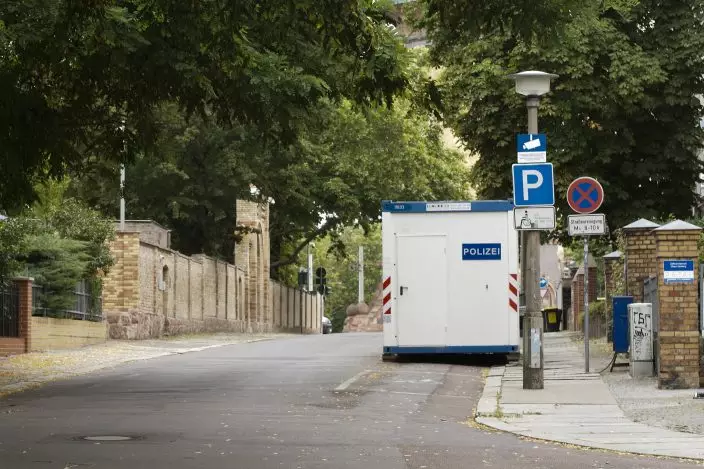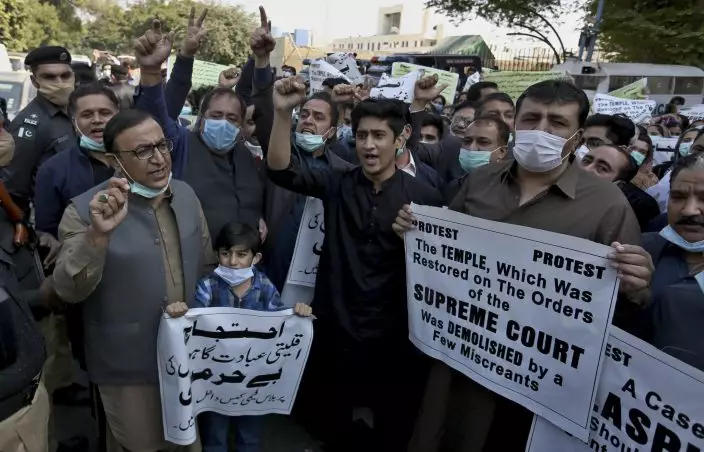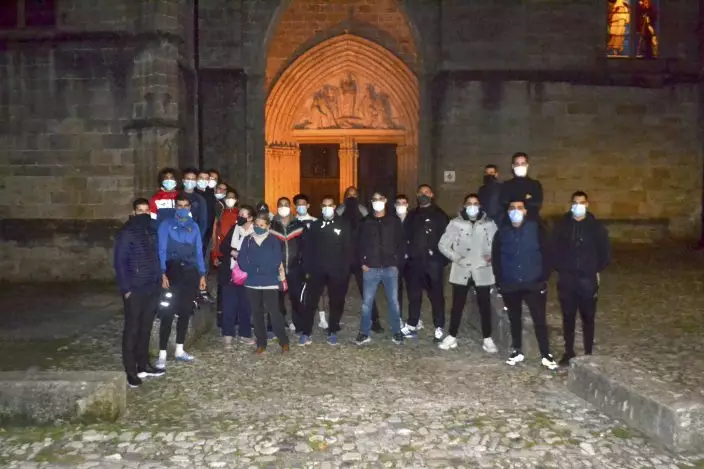The U.N. General Assembly adopted a resolution Thursday condemning damage and destruction of religious sites and asking the secretary-general to convene a global conference to spearhead public support for safeguarding places of religious heritage.
The resolution condemns the increasing targeting of “cultural property, including religious sites and ritual objects ... by terrorist attacks and outlawed militias,” often resulting in destruction as well as theft and illicit trafficking of stolen items.
It strongly deplores “all attacks on and in religious places, sites and shrines ... including any deliberate destruction of relics and monuments” which violate international law. And it condemns all threats to attack, damage or destroy religious sites, “and denounces any moves to obliterate or forcibly convert any religious sites.”

FILE - In this Monday, July 20, 2020 file photo, a container used by police is seen in front of the synagogue in Halle, Germany where a gunman made an attack on Yom Kippur 2019. Millions have be provided to enhance the security of Jewish sites, but some say it is still not enough and also doesn't tackle the question whether Jewish life can ever be normal and safe in Germany. (AP PhotoMarkus Schreiber)
The resolution was proposed by Saudi Arabia and co-sponsored by Arab nations including Egypt, Iraq, Jordan, Kuwait, Yemen, Bahrain, Sudan, Oman, the United Arab Emirates and Palestine, which is recognized as a non-member observer state by the United Nations. Bangladesh, Central African Republic, Equatorial Guinea, Mauritania, Morocco, Nigeria, Pakistan, Philippines and Venezuela were also co-sponsors.
The resolution was supported by the United States and the European Union and adopted by consensus, with Assembly President Volkan Bozkir declaring: “It is so decided.”
The resolution notes that the right to freedom of thought, conscience and religion are enshrined in the U.N. Charter and the Universal Declaration of Human Rights and that previous international efforts also focused on preventing the desecration of religious sites.

Members of Pakistan Hindu Council hold a protest against the attack on a Hindu temple in the northwestern town of Karak, in Karachi, Pakistan, Thursday, Dec. 31, 2020. Pakistani police arrested 14 people in overnight raids after a Hindu temple was set on fire and demolished by a mob led by supporters of a radical Islamist party, officials said. The temple's destruction Wednesday in the northwestern town of Karak drew condemnation from human rights activists and the minority Hindu community. (AP PhotoFareed Khan)
“Religious sites are representative of the history, social fabric and traditions of people in every country and community all over the world and should be fully respected as such,” the resolution says.
It reaffirms that “addressing the destruction of tangible and intangible cultural heritage needs to be holistic, encompassing all regions.” It must also contemplate “both prevention and accountability, focusing on acts by state and non-state actors in both conflict and non-conflict situations, and terrorist acts.”
Secretary-General Antonio Guterres is asked to convene a conference involving U.N. bodies, the 193 U.N. member nations, political figures, religious leaders, faith-based organizations, media, civil society and others to help spearhead progress on implementing the United Nations Plan of Action to Safeguard Religious Sites.

This photo take on Oct. 29, 2020 shows a group of Muslim volunteers protecting the Saint-Fulcran cathedral In Lodeve, southern France. A group of French Muslims stood guard outside the Saint-Fulcran Cathedral in Lodeve for the All Saints' holiday, to protect it from eventual violence and show solidarity with Catholic churchgoers. Many welcomed the initiative, organized by local residents as a gesture of peace after a deadly Islamic extremist attack on a church in the French city of Nice. (Alain Mendez via AP)
In the forward to the plan, released in September 2019, Guterres pointed to the surge in anti-Semitism, anti-Muslim hatred, attacks on Christians and violence targeting members of other faiths and traditions.
The plan includes measures focused on prevention, preparedness and response.
It calls on governments to ensure that religious sites “are defined as vulnerable targets” and that measures are taken to ensure they are safeguarded. It also calls on authorities to determine “soft” targets and vulnerable sites and conduct risk assessments on threats, and to “ensure that comprehensive measures are in place for the immediate response to an attack.”


